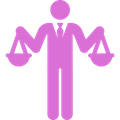Why should you attend?
Research shows that organizations with more cultural diversity:
- obtain a higher return on equity;
- deliver more innovative products and services;
- make more intelligent business decisions.
It is therefore in the interest of your organization to invest in more diversity. Most organizations therefore intend to only take into account the relevant competences in selection and promotion (and they are convinced that they actually do this).
Where it goes wrong, however, is that organizations do not take into account the effects of our human thinking errors, and more specifically implicit bias:
- Implicit bias (unconscious stereotypes) forms one of the biggest obstacles to choosing the best talent in selection and promotion processes. This is because our unconscious stereotypes lead us to favour those candidates with whom we feel more affinity, with whom we can more easily identify ourselves.
- Because these biases are unconscious, information campaigns are not sufficient to change this behaviour in your organization.
- You must therefore design the structures and processes in your organization in such a way that the space for implicit bias is minimized. By adjusting the context, you ensure that the right choice (the choice for the best talent) also becomes the easy choice. To achieve this you need to rely on behavioural insights and choice architecture.
In this training you learn how to approach this in concrete terms in your organization.
Programme
1. The pitfalls of our thinking and their impact on leadership and HR
- How does our brain work? System-1 and system-2 thinking.
- The shortcuts in our brain. Which systematic thinking errors make it difficult for us to make smart decisions?
2. Countering implicit bias in your organization
- Implicit bias with yourself and in your organization. What are we talking about?
- How implicit bias undermines diversity in your organization.
- The importance of diversity in your team and organization: not only on an interpersonal level, but also in terms of productivity, decision-making skills and innovative capacities.
3. New methodologies for selection and promotion
- Which pitfalls in our thinking influence the process of recruitment and selection? We delve deeper into implicit bias.
- Why do not you select the best candidates with an unstructured interview? You learn which methodologies to avoid because they leave a lot of room for unconscious stereotypes and bias.
- How did leading international companies adjust their recruitment and selection processes based on behavioural insights? How do they minimize the effects of implicit bias?
- How do you translate these insights into your own organization?
Your results
- You have insight into the effects of human thinking errors on selection and promotion processes.
- You understand your own behaviour and that of colleagues better.
- You know the latest methods and techniques to counter implicit bias in your organization and understand why these techniques are effective.
- You know what practical steps you can take to increase diversity in your organization and to choose the best talent.


